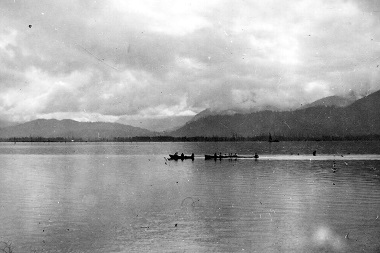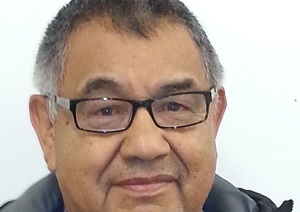
Sumas Lake was at the centre of Fraser Valley life for thousands of years, before it was drained a century ago. The Reach Gallery Archives/Image: P188
Sumas Lake until a century ago covered about 10 percent of the Fraser Valley’s fertile farmland. Then it was ‘disappeared.’ Whatever happened? And what to do about it.
A Maori Lord’s Prayer
Divine love
Wellspring of our existence
Build us into a loving community
Feed us and heal us with wisdom and grace
Shatter our prejudice and soothe the pain of our failure
Weave love and peace into our intentions and actions
So that we may stand for justice and compassion
As a reflection of the piercing tenderness we see in the heart of Jesus.
British Columbia since November 14 has been undergoing a massive emergency, due to unprecedented rainfall that led to gigantic mudslides, road washouts, flooding and death. Worst hit in the Fraser Valley, below where we live, is the Sumas Prairie of the City of Abbotsford.
It is an overwhelming tragedy for lives lost and livelihoods ruined. One can scarcely imagine the scope. Our hearts go out to those affected by such wrenching devastation.
As with other major disasters, the rising to the challenging needs of neighbour and stranger by innumerable officials and volunteers is wonderfully heartwarming and immensely uplifting. There are and will be endless accounts of heroism, compassion, empathy, etc. We’re all reading about, watching, prizing this superb outpouring of community-coming-together everywhere hard hit.
What follows was occasioned by the Deluge, but not about the above.
The tragedy and the travesty

Former Grand Chief Lester Ned
This overwhelming tragedy today points to an overwhelming travesty committed a century ago against thousands who had peopled the Sumas Lake area: a lake that was drained under the noses of – in stark terms, stolen from – Sumas First Nation.
The current horrific events cast an eerie spotlight on a century-old gargantuan injustice committed by White Settlers. There is no gentle way to state it. Calling it an injustice, a blandly inadequate term, or property theft according to the Criminal Code of Canada, are the only legitimate labels for such an incalculably grotesque high crime.
It was a tsunami in reverse.
And at that time, there was no one in the White Settler community who rallied to their aid.
“They took the lake away and we never got one inch of it,” former Grand Chief Lester Ned told The Vancouver Sun in 2013. “I don’t know how the people survived way back then.”
Should not the sheer pathos of that simple comment send chills down our spines? 1
A few points before proceeding:
- Morally: All crime cries out for confession, repentance, commitment to ‘never again’ and amends-making on the part of the perpetrator(s) and/or beneficiar(y)ies. Biblically, this is called justice-making. I’ve spent a career working on it, writing about it, puzzling over it.
- There is never a ‘right time‘ to raise this issue. Some said to me though in mid-November, “This is the wrong time.” I ask simply: If not now, when? If not now, why? We humans have enormously short attention spans, especially when it serves our purposes. However, I did put this reflection on hold for three weeks.
- Some claim there is a kind of ‘statute of limitation‘ at play here. I ask: Morally, is there ever a statute of limitation for such an horrific wrong?
- Commitment to truth, justice and compassion (as in the Maori prayer above) starts with connecting dots. If this, then that . . .
As has been said, the truth will set us free, but first it will make us miserable. Such misery, though, is the needed prologue to discovering our penitential posture and beatific vocation.
– Ken Sehested in Accountability for the murder of Ahmaud Arbery, November 24, 2021
What follows is reflection on what is common knowledge (the ‘this‘), as fellow church member and founder of Abbotsford Community Services (now Archway), Walter Paetkau, points out in an email:
I was wondering why you thought the article ‘will upset the fine Christian folk of the Fraser Valley.’ It’s a straightforward piece of information that many of us have been aware of for some years.
On the other hand, most of us are upset by how the Indigenous community was totally ignored when making the momentous decision about their land. Whether reparation will now be made as the Sumas Band is asking for remains to be seen. Maybe we all need to be paying a surcharge of some kind.
That such thoughts which follow do not upset many of the fine Christian folk of the Fraser Valley and all humanitarian-minded folk – seemingly have not done so for 100 years – surely points to something darkly evil in us all?
In testing this article out with others, a good friend who is very knowledgeable about the situation, emailed:
Land around the world has been reclaimed from the sea (most of Holland), to grow food, to feed people. Sumas Lake is only one local example. Locally, all of Chilliwack, Agassiz, Matsqui, the rest of Sumas Prairie, Delta, Richmond, parts of Surrey and Langley are behind dykes against the Fraser River.
Sumas Lake is no different. Why use the tragedy of this event to highlight issues that are systemic in all of our society – since colonial days? Yes, we need to speak truth and reconciliation to these peoples . . .
The following is a deliberate act of highlighting this tragedy to point to the horror of what was done to Aboriginals. For up until 100 years ago, and for untold millennia prior, they had been dependent on the former Sumas Lake as their primary grocery store.
Just as important, the lake also had held/holds profound spiritual significance, that we Settlers, without trying, cannot begin to understand – and too often do not care even to know or appreciate.
It is commentary on what can only be rightfully called The Great Sumas Lake Heist – one that robbed thousands of their livelihood, and destroyed thereby their millennia-long way of life. It was a tsunami in reverse. And over the past century, it rarely was taught as the gross injustice it was, in any BC school curriculum. Surely though, one must say, A rose/crime by any other name . . . (The ‘that.’)
A thriving Aboriginal community. A lake drained. Suddenly, ‘Dominion’ (read British Empire) land up for grabs. One hundred years of building up a whole new cultural presence by White folks and subsequent non-Caucasian immigrants. Ever since that Grand Larceny, it has been a guilty little secret in plain sight. White Settlers; expansive farmlands; nice whitewashed schools, community halls and churches . .
27 Woe to you, scribes and Pharisees, you hypocrites! You are like whitewashed tombs, which look beautiful on the outside, but on the inside are full of dead men’s bones and every kind of impurity. 28 In the same way, on the outside you appear to be righteous, but on the inside you are full of hypocrisy and wickedness – Jesus
Go here for the full article and for a recording of the article.
Wayne Northey retired as Director of Man-to-Man/Woman-to-Woman Restorative Christian Ministries (M2/W2) in Abbotsford, in 2014. He has been active in the criminal justice arena and a keen promoter of restorative justice since 1974.
Go here for his website, which is dedicated to ‘The Gospel as Counter-Narrative to Empire.’ This portion of the article is re-posted by permission.

I am thankful to Wayne Northey for his candid and timely reminder, when many are just longing for the flood water to recede so life can go back to ‘normal’ again.
But is it normal to feel Sumas Lake is no different from any land related issues “that are systemic in all of our society – since colonial days?” Before accepting colonialism as the norm, one should recall man and woman were not created to subjugate fellow man or God’s creation to continuous groaning. As God’s covenant people, we have a responsibility not just to God but to maintaining a just relationship with our neighbours and the creation.
The fact that many fine Christians and humanitarians do not seem to think much about all the colonial fraud, violence and horror – maybe even for a 100 years – has a darker historical backdrop. Apart from the self-serving but church-endorsed Doctrine of Discovery which kick-started the epic and unjust colonial expansion, for the 100 years between the 1899 Treaty 8 and the 2000 Nisga’a Treaty, the Canadian government simply stopped signing any treaties in BC.
Unceded Indigenous land was simply and illegally pre-empted, occupied or sold at the expense and frustration of the impoverished Indigenous people. Sadly that entrenched in the minds of generations of British Columbians growing up during that century a general ignorance of Indigenous title and rights, and a distorted sense of Canadian sovereignty, land ownership and entitlement.
To stop such destructive legacy, we need to confront our own colonial mentality, repent and rejoin the global movement towards liberating the captives and decolonizing former colonies. That was started with UN’s Universal Declaration of Human Rights in 1948.
Then, when convinced the continued existence of colonialism was impeding the social, cultural and economic development of colonized peoples, the UN’s General Assembly adopted in 1960 the Declaration on the Granting of Independence to colonial countries and peoples. This began a global movement to quickly and unconditionally end colonialism and allow independence for many former colonies.
In 1990, at the Declaration’s 30th anniversary, UN accelerated such effort by declaring the first International Decade for the Eradication of Colonialism. That was followed by the Second, Third and Fourth International Decades for the Eradication of Colonialism in 2001, 2011 and 2021.
As we are now into the Fourth International Decade, we should be shocked that few Canadians have even heard of such International Decade. The suppression of such movement while using paramilitary police to crush peaceful Wet’suwet’en resistance against the imposed fracked gas pipeline reveals our national leaders’ hypocrisy while constantly mouthing human rights and reconciliation. That indirectly explains why Canada voted against the passage of UN’s Declaration on the Rights of Indigenous Peoples (UNDRIP) in 2007, and did not withdraw its objector status until nine years later .
How then shall we live? Can we afford to be impenitent as a people and repeat history as below?
Jeremiah 6:13-14: “From the least to the greatest, all are greedy for gain; prophets and priests alike, all practice deceit. They dress the wound of my people as though it were not serious. ‘Peace, peace,’ they say, when there is no peace.”
I was raised on Sumas Lake, dubbed ‘Sumas Prairie.’ Our house would have been several feet under water 100 years ago. We were reminded every winter of the high water table of our existence when nature fought back. Fields flooded easily. Few had basements in their homes for good reason – they’d be washed out for a few months a year.
For a bit of history education, do a quick google search: ‘Sumas Lake photos.’ You may be surprised at the huge swath of territory it covered. Who knows? Maybe you were once a few feet under too, even further under than some are today.
This article is so important. It is a reminder, even in these tragic times for many who live on the Sumas Prairie, to reflect on our natural and cultural heritage. Yes, the indigenous story is also my (too often sad) white story. We need to remember where we’ve come from and the moral price we paid for the environment, land and culture, and the price of justice that remains on our debt.
If this kind of reflection causes us to be more mindful, as the Maori poem suggests, of “the piercing tenderness . . . in the heart of Jesus,” we will have made a beginning.